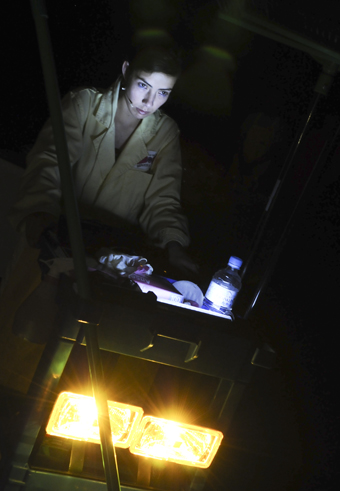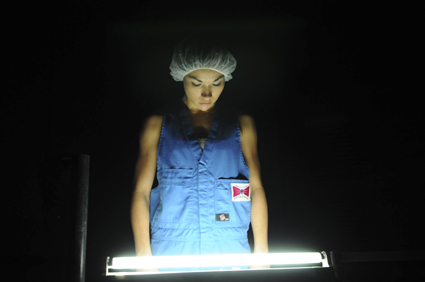work world upside down
pauline manley: branch nebula, sweat

Claudia Escobar, Sweat, Branch Nebula
photo Heidrun Löhr
Claudia Escobar, Sweat, Branch Nebula
IT’S A GREAT THING THAT THE KIND OF THEATRE THAT IS BRANCH NEBULA’S SWEAT HAPPENS IN SYDNEY. DEMOCRATICALLY DEVISED, POLITICAL AND EMOTIONALLY CHARGED, SWEAT PERFORMS A CHALLENGE TO EXPECTATION AND CONVENTION.
However, Sweat is also a diluted dream of a Sydney Front (1986-1994) production: unsurprising considering that John Baylis, onetime Front member, is the dramaturg. The sharply confronting material sometimes demanded a more robust performative substance than these young performers could provide but Claudia Escobar, Marnie Palomares, Erwin Fenis, Ali Kadhim, Ahilan Ratnamohan and Hirofumi Uchino are courageous, committed and focused.
Escobar is especially potent. She opens the piece by welcoming us with a hospitality smile that matches her waiter’s uniform. In heavily accented English she asks us politely but firmly to leave and re-enter with more alacrity, as our first entrance was not sufficiently rhythmic or efficient. This is classic Front: casting the audience as performatively responsible. And not only responsible—but uncomfortable—as Escobar asks various audience members to remove pieces of her clothing. In the undoing of buttons, witness is made oppressor as she asks me directly, while lying near naked on the floor, to stop looking at her.
Escobar’s accented text set the political narrative as determinedly racial. As we gathered in uncomfortable clumps we stood accused—of leaving all the dirty tasks of a wealthy society to people with dark skin and foreign accents. These are people who have migrated into invisibility and voicelessness, where once, in their countries of origin, they were trained, educated and skilled.
This shameful narrative is the abiding and structuring force of Sweat. The piece veers from situations of tedium and degradation to displays of skill that reveal the hidden value of these ‘shadow’ people.
In the blackened and cavernous space cleaning trolleys become sentinels and aliens, careening beams of light into an atmosphere thick with despair and repeated words. These are perhaps the most densely theatrical moments, clothing the audience in nightmare, surrounding and engulfing us.
Then there is a falling away as we are herded into groups, each with a quadrant of space and a designated performer. The shadows are filled in with the individuality of capability, with back stories of soccer, hip hop, martial arts and contemporary dance. These practices are moved as markers of worth and dignity in a world that would make them silent and invisible. This Australian story must be told and it is important that Branch Nebula is telling it.

Marnie Palomares, Sweat, Branch Nebula
photo Heidrun Löhr
Marnie Palomares, Sweat, Branch Nebula
But who are they telling it to? Certainly not to the greedy bastards of industry who deserve the full accusatory force of Sweat. And despite the textually direct ‘you’ of these accusations, they sometimes appear limp. They don’t have the force of, say, the fully furious curse of Melvin van Peebles’ bag lady in Sweet Sweetback’s Badasssss Song (1971) wishing all our children turn into junkies and prostitutes. That iconic rant was fuelled by a quietly authentic ferocity that swept the audience up into it, crushing resistance. So, at times Sweat generated annoyance more than fury. Herded around the space, the generic passivity and meekness of the theatrical audience was not subverted but extended.
Contrastingly, Sweat performed the young nubile body; displayed, revealed and aestheticised. The bodies of these performers are rich with symbolic, physical and cultural capital—bodies bathed in admiration as they exhibit their skills: bodies rich with potential, capable of enacting power, bodies at odds with victimhood. What of the older migrant worker, like the 60 year-old Indian man picking up the garbage of teenagers on Town Hall Station? Where is his story?
Towards the end, Sweat’s ‘last supper’ scene invites 12 lucky audience members to put their heads through holes in a heavy plastic tablecloth that serves as a collective bib. A good thing, for it is about to get ugly. Serenely, two waiting staff pour water and wine, left arms tucked respectfully behind their backs. This sedate ritual segues into the serving of food as art: pineapple rings with a spoonful of peas and a ‘little boy’ frankfurter. Yellow, green and red are, at first, delicately dotted on white plates. But the service gets boisterous as the servings become ludicrously generous; speedy dollops of red tomato slurry are spooned onto overflowing plates and the table starts to swim with a melange of colour disgusting to eye and palate. Horrifyingly, one waiter starts to eat the scraps: the middle-class leftovers that sustain the oppressed. He disrobes and swims face first and naked down the centre of the table, his butt crack serving another unexpected course to the guests, these disciples of excess. The last touch is confetti, sprinkled liberally over the festivities, completing the festering mess, turning the party and the world of work upside down.
Sweat, Branch Nebula, director, co-creator Lee Wilson, designer, co-creator Mirabelle Wouters, noisician Hirofumi Uchino, performers, devisors Ahilan Ratnamohan, Ali Kadhim, Claudia Escobar, Erwin Fenis, and Marnie Palomares; Performance Space, CarriageWorks, Oct 19-30
RealTime issue #100 Dec-Jan 2010 pg. 25






